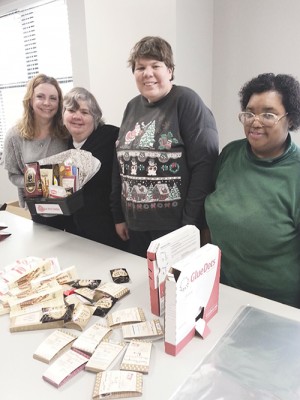
NEWARK – In Pocomoke City, Bel-Art operates two manufacturing plants and employs more than 200 people. Those employees work full time, producing everything from pipettes and beakers to lab safety equipment.
But they’re not the only ones responsible for keeping the company running.
Staff credits a team from the Worcester County Developmental Center for the behind-the-scenes support needed for the manufacturing operation.
“They’re a lifesaver for us here,” said Bel-Art’s Debbi Delslager. “We are so busy.”
Each week, Bel-Art sends packing materials and labels over to the Worcester County Developmental Center in Newark. There, clients in the facility’s work program are paid to do the company’s packaging jobs.
Bel-Art is one of several local companies that participate in the mutually beneficial work program offered to clients at WCDC.
According to Jack Ferry, director of the developmental center, nearly three quarters of WCDC clients participate in its voluntary work program. Jobs are available in food service, laundry, greenhouse, basket filling, assembly, soap making and janitorial work. Like BelArt, a number of area businesses partner with WCDC to offer work to the center’s clients.
“It helps us and it helps the businesses,” Ferry said. “We love trying new things. All of that is more opportunities for our clients.”
Joe Garner of Coastal Rentals has been working with the developmental center for nearly five years. When the company responsible for laundering the linens he rents to vacation homes went out of business, staff there told him the same service was offered by WCDC. He’s been with them ever since.
“They pick it up, launder it, sort it, fold it and return it,” he said, adding that they handled as much as 1,500 pounds of linens a week for him in the summer. “They do a great job and getting under-employed people into the workforce is an added bonus.”
Gifts Fulfilled, maker of custom gift baskets, is a new business in Worcester County that just began working with the developmental center. Kim Shanahan started the company after moving to Ocean City and knew she wanted to partner with WCDC.
“I first started thinking about employing disabled adults five years ago when I was pregnant,” she said. “As a mature woman in pregnancy there are more risks and I began to wonder how I would help my child if it were born with a disability. I realized my business could be set up in such a way as to employ disabled people and the fire was lit in my heart to make it happen.”
Ferry says the addition of new partnerships with area businesses enable WCDC to offer more options to its clients. Those who attend the center, if they want to work, typically choose a job to pursue after trying a few different tasks and determining where their talent lies.
The jobs they’re given are more than just a way to stay busy for four or five hours a day. They provide WCDC clients with a sense of empowerment and a way to be a part of the community.
“Our clients don’t have all the opportunities we have,” Ferry said. “This is a way for them to give back. They feel they’re contributing to the community.”
In addition to providing their skills to the local workforce, they’re contributing the money they earn to the local economy. Ferry says that while some spend their earnings on bills, others use it for shopping and entertainment.
“It has an economic impact on the community as well as on the client,” he said.
Ferry is currently fighting to ensure the developmental center can continue to offer its work program. As of right now, some clients hold jobs in the community while the majority participate in center-based employment—the jobs in the greenhouse, laundry, etc. offered at the center in Newark. That, Ferry says, is because some simply can’t handle positions in the community.
That center-based employment however is at jeopardy as the state puts together its plan to come into compliance with the Centers for Medicare and Medicaid Service final ruling regarding home and community based services. Maryland, like most states, appears to be heading toward the elimination of center-based work programs.
Ferry said he was meeting next week with members of the Eastern Shore Delegation and officials from the state’s Department of Health and Mental Hygiene to discuss the issue.
“We’re still fighting the fight to see if there are ways we can work together,” he said. “We’re still trying to allow center-based work as a choice for the clients.”

